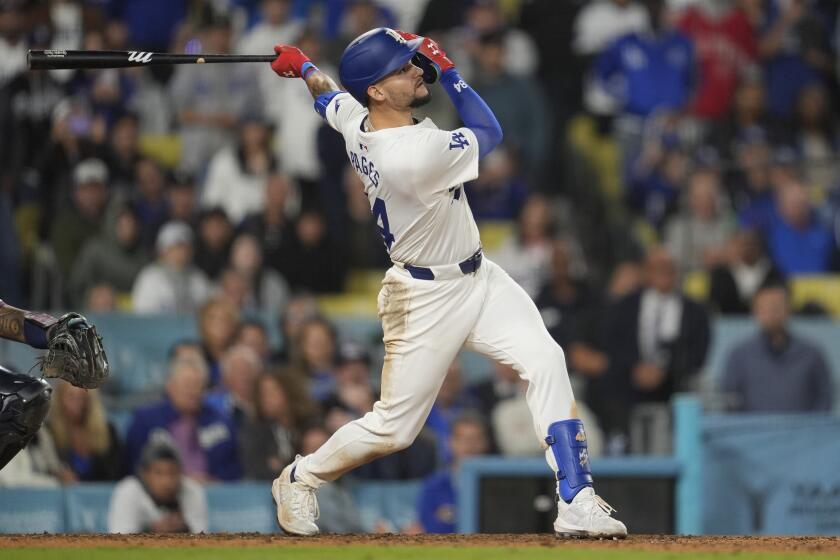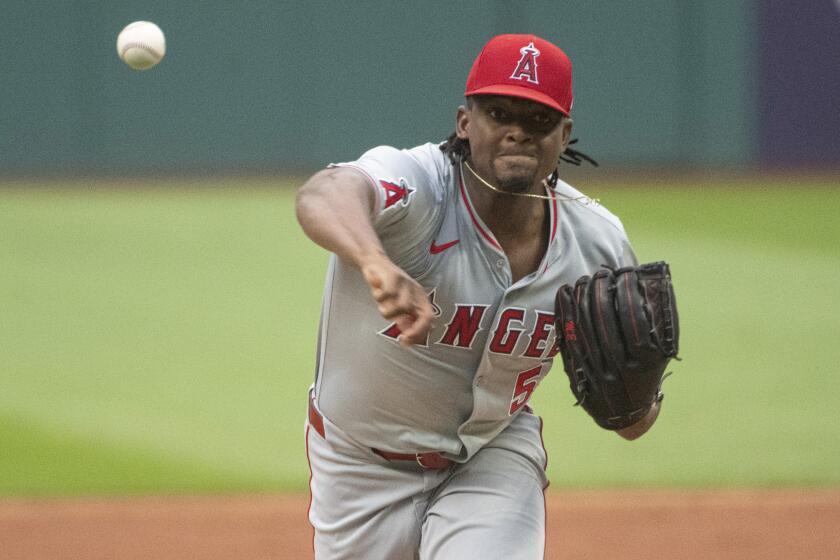Last Call
Ernie Harwell did not know Chick Hearn. Never met him, never heard him. And, being Ernie Harwell, he almost apologizes for that shortcoming.
“Of course I knew of his great reputation and the hold that he had on this region here,” Harwell said Monday evening at Edison Field before pulling on the headset for the Detroit Tigers’ latest defeat against the Angels. “I never was fortunate enough to hear him.”
Harwell, however, can relate to the void that has low-bridged Southern Californians since Hearn’s passing last week. He understands how a media capital supposedly as savvy and cynical as Los Angeles can break down, let its guard down, and devote head-of-state-type coverage to the death of a local basketball announcer.
“I think when a guy comes into a region like Chick did, and they’re here for [a number of] years, people get used to them,” Harwell said. “People get used to the way you call a game, and you become like an old slipper that they put on. People feel comfortable with them.
“And then they take you to the mountains and the beaches and picnics. Especially with radio, you become the background of their lives. It’s almost like a sports Muzak. You’re in the background, you know, and you’re there and they’re not listening closely a lot of times, and then when you say something, maybe they pay attention for a while and then drift away. You become a part of the family. And you’re a conduit between the team and the public.
“The players change--especially now--and come and go, but the announcer stays around. He becomes sort of an anchor that they can hold onto. They really embrace the guy. He becomes a part of their lives.”
Harwell speaks from experience, having witnessed his own memorial service of sorts nearly a dozen years ago. Hall of Fame broadcaster and best friend to millions of Tiger fans he never met, Harwell was fired by Tiger management after the 1990 season, told to take a farewell tour in 1991 and call it a career after that.
Then 72, after 31 years with the Tigers, he was told he was too old, his easy-listening style too outmoded for the fast-track, ironic, sensory-overloaded 1990s.
It became the biggest baseball public-relations blunder to have absolutely nothing to do with Bud Selig.
Tiger fans revolted, with major Michigan media outlets leading the charge. After a season’s worth of outrage, coupled with a change in team ownership, Harwell returned to the Tiger broadcast booth in 1993, more or less on demand.
Harwell’s hold on that region surprised even him.
“I didn’t think we’d ever have the uproar that they had,” he said. “I thought, you know, somebody would call the ballpark in a couple of weeks and say, ‘Hey, what happened to that guy who used to do the games?’ It was gratifying to me to see people [cared]....
“I never thought I’d come back. Once I got fired, that was it.... Lucky for me, Mike Ilitch bought the team from Tom Monaghan and the first thing he told me, he said, ‘I want you to come back and you can stay as long as you want to.’ I really appreciated the confidence he had in me. That’s probably the most important thing to have happened, certainly in the latter part of my career.”
Now 84, Harwell is currently in the midst of Farewell Tour 2, which he laughingly calls “a little more embarrassing” than the first. And, no doubt, happier. This time, Harwell is going out on his own terms. Given the chance to stay as long as he wanted, Harwell decided this spring he’d stay until the final out of the Tigers’ 2002 season, bringing a 60-year broadcasting career to a close.
“I sort of felt I could work another four or five years,” he said. “But, you know that old gag: ‘I heard your last show--and it should have been.’ I didn’t want anybody to say that. I wanted to quit while I was still doing it pretty well.
“I didn’t mind the travel like a lot of guys do. My health’s good. All these things pointed to working some more. But I think you’ve just got to make up your mind and arbitrarily say, ‘This is it.’ So I just happened to pick this year, rather than wander down the line another year or two.”
It hasn’t been a good year for the sports broadcasting industry. Hearn and Jack Buck passed away. Harwell is nearing retirement. Vin Scully continues to hold the fort at Chavez Ravine, but an entire era, the golden generation of sports announcers reared on radio before television changed the craft forever, is fading away before our ears.
In their wake: a new generation of announcers who, with few exceptions, sound virtually indistinguishable from each other.
“When I started, everybody was sort of flying by the seat of their pants,” Harwell said. “We didn’t have too many models. Now, Vinnie’s so good, everybody imitates him. And you’ve got a lot of guys that sound alike. And they have a lot more trained voices than we had.
“When I came along, there were a lot of guys who were coming out of different occupations like lawyers and newspaper guys. Guys like that became announcers. They’re getting back to that with the analysts, but the play-by-play guys now are mostly university-trained and they have their radio-station school and they listen to guys all the time.
“And I think there is probably a sound-alike syndrome that we have now that probably didn’t happen when Bob Prince and Mel Allen and [Red] Barber and those guys were working.”
Another obstacle confronting today’s generation: ESPN, the worldwide leader in catchphrase contrivances. The influence of “SportsCenter’s” sit-down stand-up routines has been monumental on--and mostly detrimental to--the new wave of aspiring sportscasters looking to make its mark.
Harwell has his catchphrases. So did Hearn--enough of them to fill a full volume. But if Harwell has a lesson to pass along to the youngsters wanting to try the same at home, it is this: Don’t force it.
“If you’re a certain way off the air, you should be that way on the air,” he said. “Every time I tried to figure out something cute, it didn’t work.”
His catch phrases--”Ernie-isms” to his audience--mostly evolved naturally.
He’s out for excessive window-shopping. Harwell: “That’s a called third strike--he just looked at one too many. I just said that one time and people started calling [to say they liked it].”
He stood there like a house by the side of the road. Harwell: “Another one where they strike out looking. That’s from an old poem I used to recite as a kid.”
Long gone! Harwell: “That’s my so-called signature call. I didn’t even do that until the mid-’80s. It just happened. I began to say, ‘It’s long ... it’s long ... it’s long gone’ and I sort of reduced it to ‘long gone.’ Those things just happen.”
They’re looking for instant runs. Harwell: “You know in the eighth and ninth inning, when they’re trying to produce some runs. I started by saying, ‘They’d like to open up a can of instant runs.’ ”
The way Harwell reasons, “You just can’t say ‘ball’ and ‘strike’ for three hours. But I think style really should evolve naturally. I don’t think you can say, ‘Hey, I’m going to do this or that.’ Vinnie doesn’t have any signature calls, really, not like a lot of guys. And he’s probably the best that ever came along.”
Scully replaced Harwell in the Brooklyn Dodgers’ broadcast booth in 1950, after Harwell moved across town to the Giants. “My claim to fame,” Harwell said with a laugh. He playfully boasts that he helped Scully get his big break a few months earlier when Harwell, covering college football for CBS, had a late switch in assignments, opening up the game Harwell originally was supposed to work for Scully.
“I remember reading that he did a good job and impressed Red Barber and when Red thought about hiring a new announcer, he remembered that,” Harwell said. “So that’s my contribution to broadcast history.”
Harwell broadcast football, both college and professional, for many years.
He says he enjoyed the game, but leaves no question as to which sport is his favorite to call.
“I always felt that football, if you were authoritative and sounded like you knew what you were talking about and didn’t hesitate, you could say almost anything,” he said.
“Baseball people are so much more discerning. The fans know so much more about the game. Plus, it’s a day-to-day thing. You can’t fool ‘em as easily over a whole summer as you can on a Saturday afternoon....
“I think people appreciate you more in baseball. When I did football, guys in my neighborhood would say, ‘Hey, what are you doing this winter? Oh, you’ve got a football game this weekend?’ In baseball, they’ve got to know you’re there, because you’re on so much.”
Except, for Harwell, no more after 2002.
His future plans include the continuation of his weekly column for the Detroit Free Press, along with taping “vignettes, about three, four minutes long” for Fox. Maybe “write a book or two.”
But he has ruled out any special appearances in the broadcast booth.
“I think once you quit, you have to quit,” he said. “You can’t fool around anymore.”
Unlike the current Tiger team clumsily escorting Harwell into retirement. He would have preferred going out covering a champion--everyone’s in a better mood when the team is winning, he says--but Harwell can’t complain.
When a visitor to the radio booth greeted Harwell, asking him how it’s going, the man who was fired 12 years ago only to rally for a decade’s worth of last laughs, laughed again, winked and cheerfully replied, “Nothing a 20-game winning streak wouldn’t take care of.”
(BEGIN TEXT OF INFOBOX)
The Harwell File
Birth: Earnest “Ernie” Harwell was born Jan. 25, 1918, in Washington, Ga.
Baseball announcer: 60 years, 42 with the Detroit Tigers.
BASEBALL RESUME
1943: Announcer for Southern Association’s Atlanta Crackers’ games.
1948: Became only broadcaster traded for a player when Earl Mann, president of the Atlanta Crackers, agreed to let him go to Brooklyn if General Manager Branch Rickey would send Montreal catcher Cliff Dapper to Atlanta to manage the club.
1950: Broadcaster for New York Giants.
1954: Hired to be voice of Baltimore Orioles.
1960: Hired to be voice of Detroit Tigers.
1991: Last season before being fired by Detroit.
1992: Worked with CBS and California Angels.
1993: Rehired by Detroit.
2002: Announces he will retire after the season.
MEMORABLE MOMENTS
* Broadcast the debut of Willie Mays in 1951.
* Voice of the first coast-to-coast television broadcast of a major sporting event (Bobby Thomson’s “Shot Heard ‘Round the World” in 1951).
* Called Hoyt Wilhelm’s 1958 no-hitter against the Yankees.
* Called first American League Championship Series.
* Called three World Series, and numerous postseason games for the individual teams he has covered.
* Called two All-Star games for CBS Radio.
AWARDS
* Presented with the Ford Frick award in 1981 for broadcasting excellence, and thus became a member of the Baseball Hall of Fame in Cooperstown.
* Elected to the National Sportscasters Hall of Fame in 1989.
More to Read
Go beyond the scoreboard
Get the latest on L.A.'s teams in the daily Sports Report newsletter.
You may occasionally receive promotional content from the Los Angeles Times.





